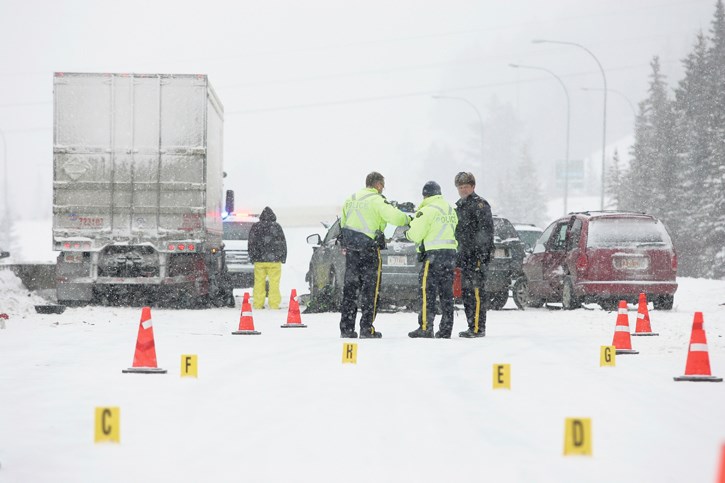BANFF – Banff’s RCMP are struggling to keep up with the workload in the busy tourist town with the number of officers they have.
With more than four million people visiting Banff every year and almost 10,000 permanent and short-term residents, the 16-member detachment is run off its feet and is in discussion with the Town of Banff about additional staffing.
RCMP officials say although Banff is a safe place for residents and visitors, and the severity of crime is going down, the local detachment is struggling to find time for proactive crime prevention and investigations.
“The bottom line is we’re struggling. We are struggling with the resources we have to provide what we consider an adequate service,” said Staff Sgt. Mike Buxton-Carr, a 20-year veteran with the police force.
“The amount of members we have is not even keeping pace with the increased visitation, but also with an expansion in the mandate of police.”
Buxton-Carr said in the past the RCMP primarily dealt with criminal behaviours and responses, but these days there is a requirement to deal more and more with mitigating “social problems and behaviours”.
“We’re dealing with the things that don’t show up in a crime severity index, they don’t show up as a criminal statistic, such as mental health,” he said.
“We have become, and I would put paramedics in the same role, de facto frontline mental health workers.”
In cases where someone requires hospitalization, the RCMP can no longer take the person to Mineral Springs Hospital, but must travel to a dedicated facility and the closest one is in Calgary.
“That’s a lot of hours on the road for the transport, let alone waiting to be seen with the patient,” he said. “That happens a lot more than you think.”
On top of that, Buxton-Carr said the amount of time it takes to conduct investigations has exponentially increased, noting much of this is policy driven, particularly with new standards for the courts.
He said changes in technology have also made policing incredibly complex.
“Detecting evidence, seeking evidence, obtaining evidence, interpreting evidence takes a tremendous amount of resources, time and training,” he said.
The Town of Banff contracts the RCMP for its policing services and pays for 12 members as part of that agreement. The Town also provides four municipal clerical employees that provide support services to the RCMP detachment.
As part of Banff’s incorporation agreement in 1990, the province of Alberta, in essence, agreed to provide funding to cover costs for an additional seven Mounties on top of what the municipality was paying for.
It was in recognition of the community’s unique circumstances as a resort town, which serves 8,800 permanent residents, a large transient workforce and now hosts more than four million visitors a year with predictions of continued tourism growth.
In 2010, however, the province cut funding, effectively funding four positions instead of seven. After that, Banff agreed to pay for one more cop, for a total of 12 police officers.
Pleas to the province to provide more funding have been unsuccessful so far. The province says there are currently no plans to revisit the funding arrangement.
Robert Earl, Banff’s town manager, said the municipality is in conversation with the local detachment commander about the size of the detachment and the need to add additional members.
“There will be conversations relative to additional members for traffic enforcement, however there is a need that’s continuing to be demonstrated for additional membership for more general duties,” he said.
“As we continue to see the level of visitation rise, we need to have a conversation about what would be the triggers that would cause us to look at additional police officers, either because there’s identified gaps we want to fill, or we’re not being as effective as we’d like.”
Councillor Ted Christensen, who sits on the police committee, wants to see funding for two more positions.
“I understand there is a critical concern in the department about being on a balance point,” he said. “With the opioid crisis, which seems to be converging on every other centre in our province, and with the legalization of marijuana presenting a renormalization of some drugs, I find that we might be at a critical point.”
Seldom do big-time crimes occur in Banff, although there have been vicious attacks and rapes on women in recent years, huge drug busts and the 1990 murder of local cabbie Lucie Turmel.
In one of the highest profile cases, Albert Muckle brutally raped and tried to kill a pregnant woman in 2005, leaving her in a vegetative state. He was declared a dangerous offender and is serving an indeterminate sentence after pleading guilty to aggravated sexual assault and attempted murder.
Despite the heavy workload, Buxton-Carr stressed that Banff is a safe community.
“I still feel safe walking down the streets of Banff, I feel we’re a welcoming town, I still feel we’re a place to invite visitors and to raise children,” he said, noting the challenge is in the day-to-day policing.
“Day-to-day we’re struggling to complete quality investigations and do the crime prevention we need to do, whether it’s opioids, or whether it’s traffic safety.”
Silvio Adamo, the Town of Banff’s protective services manager, said the severity of crime in the community is going down.
He said he believes that relates to a change in the service industry worker demographic, a reduction in the number of nightclubs to two and a focus on late-night proactive policing since 2008.
Adamo said the Bar Watch program and ID scanning has helped reduce the crime severity index, including gang members from Calgary heading to Banff.
“Previous staff sergeants had brought up the issues of gang-related activity here, with folks from Calgary coming up to Banff to get away from or getting involved in altercations,” he said. “Bar Watch and ID scanning has deterred that type of visitation, and as a result, the crime severity has been reduced as well.”




